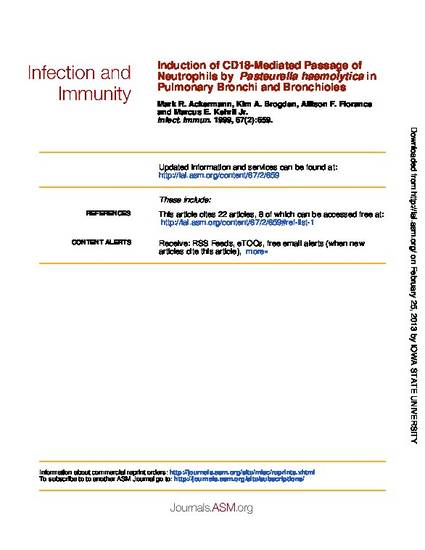
Article
Induction of CD18-Mediated Passage of Neutrophils by Pasteurella haemolytica in Pulmonary Bronchi and Bronchioles
Infection and Immunity
Document Type
Article
Disciplines
Publication Date
2-1-1999
Abstract
Pasteurella haemolytica is an important respiratory pathogen of cattle that incites extensive infiltrates of neutrophils into the lung. In addition to the parenchymal damage caused by factors released by P. haemolytica, neutrophils contribute to the pathologic changes in the lungs. Molecules which mediate neutrophil infiltration into the lungs duringP. haemolytica pneumonia are poorly characterized. To determine whether the CD18 family (β2-integrin) of leukocyte adhesion molecules mediates initial passage of neutrophils into the pulmonary bronchi and bronchioles of lungs infected withP. haemolytica, three Holstein calves homozygous for bovine leukocyte adhesion deficiency (BLAD) (CD18-deficient neutrophils), and three age- and breed-matched control calves (normal CD18 expression) were inoculated with P. haemolytica A1 via a fiberoptic bronchoscope and euthanized at 2 h postinoculation. Sections of lung were stained for neutrophils, and the intensity of neutrophilic infiltration was determined by computerized image analysis. Significantly fewer (P < 0.05) neutrophils infiltrated the lumen, epithelium, and adventitia of bronchioles and bronchi in lungs of calves with BLAD compared to normal calves, which had dense infiltrates within these sites at 2 h postinoculation. The reduced infiltration in calves with BLAD occurred despite the presence of an extremely large number of neutrophils in peripheral blood that is typical for these calves. The large number of neutrophils in the blood of calves with BLAD is probably a physiologic response that can occur without microbial colonization, since one calf with BLAD that was raised under germ-free conditions had large numbers of neutrophils in the blood that were similar to those in a calf with BLAD that was raised conventionally. Neutrophil counts in the germ-free and conventionally reared calves with BLAD were much higher than those in the three normal calves raised under germ-free conditions. The work in this study demonstrates that during the initial inflammatory response, neutrophils with normal CD18 expression pass more readily than CD18-deficient neutrophils into the walls and lumen of bronchi and bronchioles. It suggests that CD18 is needed for initial passage through the extensive extracellular matrix of the bronchi and bronchioles. This has potential importance for the development of therapies to direct or inhibit neutrophil infiltration into conducting airways rather than alveolar spaces.
Copyright Owner
American Society for Microbiology
Copyright Date
1999
Language
en
File Format
application/pdf
Citation Information
Mark R. Ackermann, Kim A. Brogden, Allison F. Florance and Marcus E. Kehrli. "Induction of CD18-Mediated Passage of Neutrophils by Pasteurella haemolytica in Pulmonary Bronchi and Bronchioles" Infection and Immunity Vol. 67 Iss. 2 (1999) p. 659 - 663 Available at: http://works.bepress.com/mark_ackermann/15/

This article is from Infection and Immunity 67, no. 2 (February 1999): 659–663.